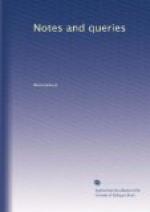1. The Maccabaei from Hebr. Makkab, a hammer.
2. Edward I., “Malleus Scotorum.”
3. “St. Augustine, that Maul of heretics, was in chief repute with” Josias Shute, among the Latin Fathers. (Lloyd’s Memoires, p. 294.) “God make you as Augustine, Malleum Haereticorum.” (Edward’s Gangraena, Part II. p. 17. 1646.)
4. “Robertus Grossetest, Episcopus Lincolniensis, Romanorum Malleus, ob. 1253.” (Fulman, Notitia Oxon. p. 103. 2nd ed.)
5. “Petrus de Alliaco, circ. A.D. 1400, Malleus a veritate aberrantium indefessus appellari solebat.” (Wharton in Keble’s Hooker, i. 102.)
6. T. Cromwell, “Malleus Monachorum:” “Mauler of Monasteries” [Fuller, if I recollect rightly, quoted by Carlyle]. Also, “Mawling religious houses.” (Lloyd’s State Worthies, i. 72. 8vo. ed.)
7. Bishop Prideaux, “Malleus Haerese[=o]s.” (Wood, Ath. Oxon. iii. 267.)
8. Hooker, “Schismaticorum Malleus,” Bp. H. King’s Letter to Iz. Walton.
9. Peter Gunning, “Schismaticorum Malleus.” (Barwick’s Life, p. 22. Latin ed.)
10. Archbishop Usher, “Errorum malleus.” (Univ. of Oxford. Parr’s Life of Usher, p. 101.)
11. Henry Hammond, Errorum maleus, &c.. (Lloyd’s Memoires, p. 401.)
12. Dean Comber, “falsi Malleus”. (Ib. v. 450.) The reader will at once recollect “The hammer of the whole earth,” in Jeremiah, L. 23. Grotius, in his note on the “Malleus universae terrae” of that passage, says,—
“Sic vocat Chaldaeos,
pari de causa ut ob quam
Francorum quidam dictus est
Martellus”.
Compare George Herbert of Lord Bacon,—“Sophismatum Mastix ... Securis que errorum,” &c. &c. (Poems, p. 253, ed. 1844.) Nor must we forget Attila, “the scourge of God.”
R.A.
Charles Martel (Vol. i. p. 86.)—The following note may perhaps be acceptable in conjunction with that of G.J.K. (p. 86.), on Charles Martel. It is taken from Michelet’s History of France, an easily accessible work.
“Charlemagne is usually considered as the translation of Carolus Magnus. ‘Challemaines si vaut autant comme grant challes.’ (Chro. de St. Denis, 1. i. c. 4.) Charlemagne is merely a corruption of Carloman, Karlmann, the strong man. In the above-cited chronicle itself, the words Challes and Challemaines are used for Charles and Carloman (maine, a corruption of mann, as leine of lana). In the Chronicle of Theophanes a still more conclusive text is found: he calls Carloman [Greek: Karoullomagnos]; Scr. fr. v. 187. The two brothers must have borne the same name. In the 10th century, Charles the Bald was dignified, though most undeservedly, with the same title of Great, through the ignorance of the Latin monks.—Epitaph. ap Scrip. fr. vii. 322.
...
Nomen qui nomine duxit
De Magni Magnus, de Caroli
Carolus.




